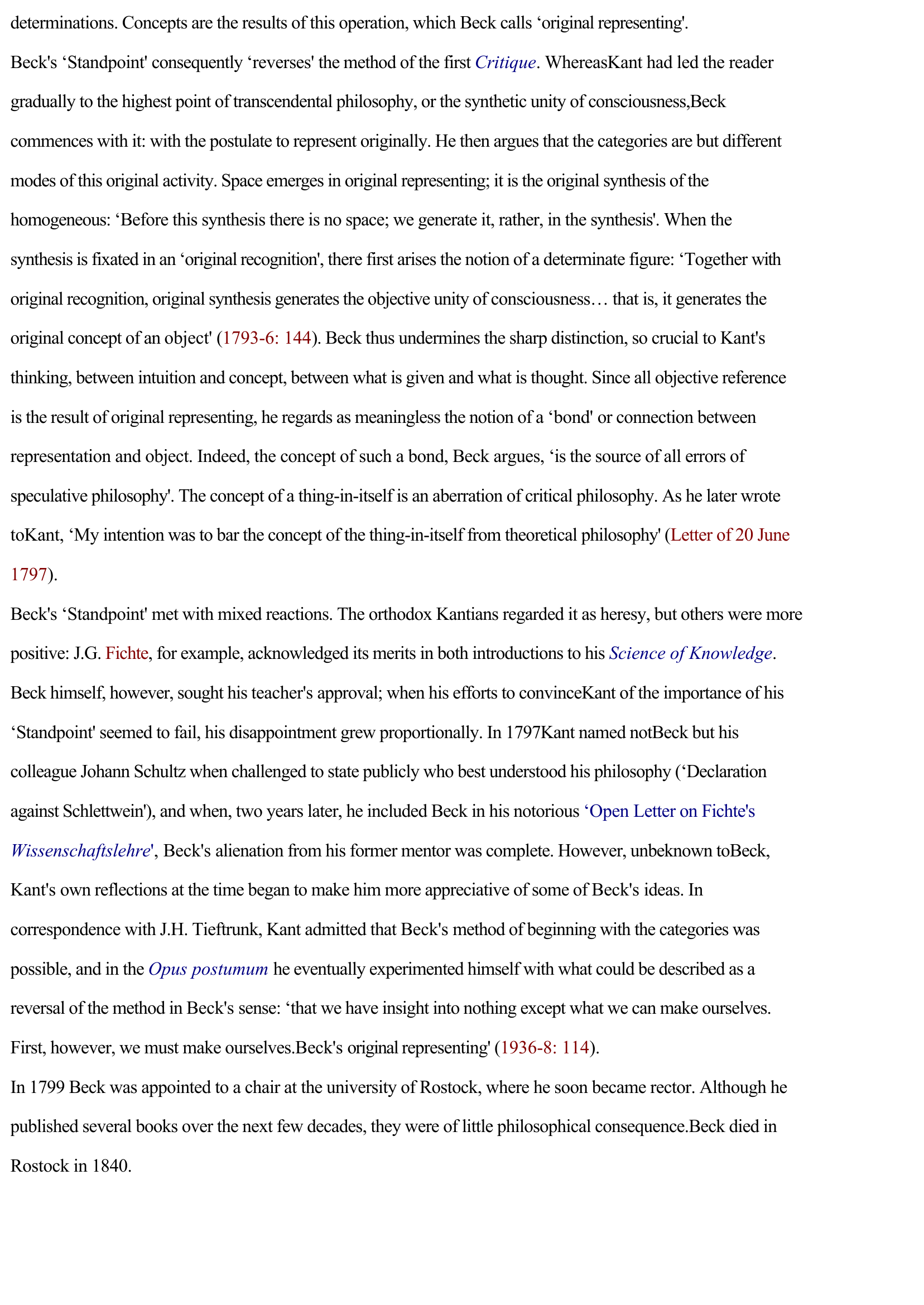Beck, Jacob Sigismund
Publié le 22/02/2012

Extrait du document
«
determinations.
Concepts are the results of this operation, which Beck calls ‘original representing' .
Beck's ‘Standpoint' consequently ‘reverses' the method of the first Critique .
WhereasKant had led the reader
gradually to the highest point of transcendental philosophy, or the synthetic unity of consciousness,Beck
commences with it: with the postulate to represent originally.
He then argues that the categories are but different
modes of this original activity.
Space emerges in original representing; it is the original synthesis of the
homogeneous: ‘Before this synthesis there is no space; we generate it, rather, in the synthesis' .
When the
synthesis is fixated in an ‘original recognition' , there first arises the notion of a determinate figure: ‘Together with
original recognition, original synthesis generates the objective unity of consciousness… that is, it generates the
original concept of an object' (1793-6: 144 ).
Beck thus undermines the sharp distinction, so crucial to Kant's
thinking, between intuition and concept, between what is given and what is thought.
Since all objective reference
is the result of original representing, he regards as meaningless the notion of a ‘bond' or connection between
representation and object.
Indeed, the concept of such a bond, Beck argues, ‘is the source of all errors of
speculative philosophy' .
The concept of a thing-in-itself is an aberration of critical philosophy.
As he later wrote
toKant, ‘My intention was to bar the concept of the thing-in-itself from theoretical philosophy' (Letter of 20 June
1797 ).
Beck's ‘Standpoint' met with mixed reactions.
The orthodox Kantians regarded it as heresy, but others were more
positive: J.G.
Fichte , for example, acknowledged its merits in both introductions to his Science of Knowledge .
Beck himself, however, sought his teacher's approval; when his efforts to convinceKant of the importance of his
‘Standpoint' seemed to fail, his disappointment grew proportionally.
In 1797Kant named notBeck but his
colleague Johann Schultz when challenged to state publicly who best understood his philosophy ( ‘Declaration
against Schlettwein' ), and when, two years later, he included Beck in his notorious ‘Open Letter on Fichte's
Wissenschaftslehre ', Beck's alienation from his former mentor was complete.
However, unbeknown toBeck,
Kant's own reflections at the time began to make him more appreciative of some of Beck's ideas.
In
correspondence with J.H.
Tieftrunk, Kant admitted that Beck's method of beginning with the categories was
possible, and in the Opus postumum he eventually experimented himself with what could be described as a
reversal of the method in Beck's sense: ‘that we have insight into nothing except what we can make ourselves.
First, however, we must make ourselves. Beck's original representing' (1936-8: 114 ).
In 1799 Beck was appointed to a chair at the university of Rostock, where he soon became rector.
Although he
published several books over the next few decades, they were of little philosophical consequence.Beck died in
Rostock in 1840..
»
↓↓↓ APERÇU DU DOCUMENT ↓↓↓
Liens utiles
- François Jacob, extrait de Le Darwinisme aujourd’hui
- biographie de max jacob
- Moreno, Jacob Levy - psychologie & psychanalyse.
- CORNET À DÉS (le). Recueil poétique de Max Jacob (résumé de l'oeuvre & analyse détaillée)
- LÉON MORIN PRÊTRE de Béatrix Beck (résumé)

































